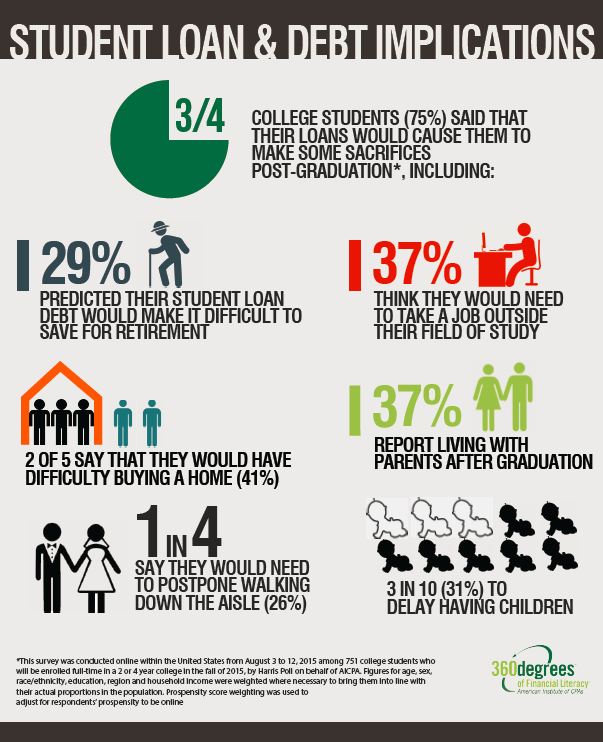While a college education is often a stepping stone to financial security, the high cost of individual student loans may be forcing many students to postpone major decisions such as marriage, having children, purchasing a home, or saving for retirement.
Many students also said their loans mean they would likely be living with their parents after graduation and might have to take a job outside their field of study (37 percent each), according to an August 2015 online survey conducted by Harris Poll on behalf of the American Institute of CPAs (AICPA) among 751 college students who enrolled in fall of 2015.
Although most college students who have student loans (59 percent) say their loans will take less than a decade to pay off, a majority (79 percent) didn’t know exactly how much they will have taken out in loans in total, upon graduation. More than one-in-three (36 percent) either had no idea or a vague idea of the total amount of their loans upon graduation. More than two-in-five (43 percent) had a general idea of the amount of their loans, while only one-in-five (22 percent) knew the exact amount of their loans in total, upon graduation.
“Every college student taking out loans should know what they are borrowing per semester and their projected balance upon graduation,” said Greg Anton, CPA, CGMA, chair of the AICPA National CPA Financial Literacy Commission. “This information is crucial to determine how burdensome the debt will be post-graduation and weigh alternatives if the amount is simply too high. It’s impossible to do this without knowing the loan amount.”
On average, college students who have student loans thought they would be able to pay back their loans in nine years after graduation, with only 18 percent saying that it would take them more than ten years. A quarter of college students with loans either didn’t know how long it would take them to pay them back (18 percent) or had never thought about it (6 percent).
“While a college education is increasingly essential in today’s economy, student loans take years to pay off and can cause individuals to put their life’s ambitions on hold,” Anton said. “It’s encouraging that students seem to understand that the decisions they make about how to fund their education have the potential to stick with them throughout their post-graduation life.”
Three-quarters of college students (75 percent) acknowledged that their student loan debt would require some sacrifices in their lives post-graduation. Two-in-five (40 percent) said that they would have difficulty purchasing a home and thirty-seven percent reported they would be living with their parents after graduation, with the same percentage predicting they would need to take a job outside their field of study. Additionally, 29 percent felt their student loan debt would make it difficult for them to save for retirement.
Loan debt is also impacting students’ family plans with three-in-ten (31 percent) stating they would be forced to delay having children and one-in-four (26 percent) saying they would need to postpone walking down the aisle.
There is a silver-lining to the survey: while college students may feel like their loans will impact their life choices post-graduation, they are eager to learn how to develop their financial skills, with 84 percent saying that they are extremely or very interested in learning how to make better financial decisions.
The National CPA Financial Literacy Commission offers the following tips to help students learn how to manage the costs of a college education.
• Do not take out more in total student loan debt than you can reasonably expect to earn in your first year in the field of your major.
• Exhaust every available source of “free” money before getting any type of student loan. Research has shown not all students eligible for Pell Grants apply for them.
• Meet with a financial advisor at school to discuss available scholarships.
• Be aware of the difference in pay-off options between Federal and private student loans.
These and other tips for taking out and paying off student loans can be found on the AICPA’s 360 Degrees of Financial Literacy web site at 360Financialliteracy.org.
AICPA to Host Free Webcast on Student Loans and Budgeting
On Wednesday, November 18, 2015 at 1 PM ET, AICPA National Financial Literacy Commission members Michael Eisenberg, CPA/PFS, and Kelley Long, CPA/PFS, will provide attendees with best practices and free tools they can use to improve their financial lives. The free webcast, entitled “Saving and Spending 101: What College Students Need to Know About Loans and Budgeting,” is designed for college students, parents, and those with student loans to learn tips and techniques to take charge of their finances. Register for free online.
Thanks for reading CPA Practice Advisor!
Subscribe Already registered? Log In
Need more information? Read the FAQs
Tags: Taxes




